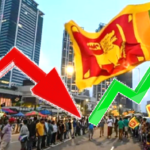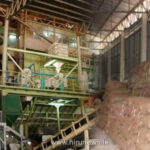
Wide Angle Focus on Liquor Licenses, Speaker’s Credentials, and Foreign Relations
- CNL Reporter
- December 8, 2024
- Weekly Political Review
- Wide Angle Focus on Liquor Licenses
- 0 Comments
Weekly Political Review
Efficient governance, economic reforms, and Indo-Lanka ties dominate political landscape.
By Rohana Jith
Sri Lanka’s political and economic discourse remains turbulent, shaped by critical issues of governance, transparency, and international relations.
While major challenges like rising food prices, energy policy uncertainties, and pension payment delays demand urgent attention, recent parliamentary sessions have been overshadowed by controversies over liquor licenses, allegations regarding Speaker Ashoka Ranwala’s qualifications, and preparations for President Anura Kumara Dissanayake’s first official visit to India.
Parliamentary Sessions: Misplaced Priorities?

Despite the gravity of issues such as food shortages, fertilizer subsidy delays, and inclement weather relief, Parliament largely sidestepped these concerns. The Government, dominated by a new cohort of parliamentarians, focused its attention on three contentious themes: racism, accusations of the Opposition fueling ethnic divides, and the liquor license saga from the Ranil Wickremesinghe administration. This strategic pivot allowed the ruling coalition to avoid critical debates while baiting the Opposition into a defensive stance.
The lack of a unified Opposition response further deepened this dynamic. Instead of steering discussions toward economic hardships or governance failures, the Opposition remained mired in retaliatory rhetoric, allowing the Government’s agenda to dominate.
The Liquor License Controversy
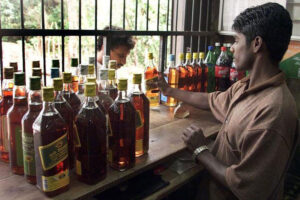
A heated debate unfolded last week over the issuance of 361 liquor licenses from January to October 2024. These included 172 licenses for wine stores and raised suspicions of political patronage.
Notably, one license in Puttalam district was linked to the son of UNP General Secretary Palitha Range Bandara. . While former President Ranil Wickremesinghe defended the process as a revenue-generating initiative carried out transparently, allegations persisted that licenses served as political favors to induce MP loyalty during his tenure.
The current Government tabled these details in Parliament, fueling accusations of corruption. However, the list conspicuously omitted the names of MPs who may have recommended these licenses, further intensifying public skepticism. Amidst these revelations, President Dissanayake has ordered a temporary halt to new liquor license issuances, promising a comprehensive inquiry.
Speaker Ashoka Ranwala’s Questionable Credentials
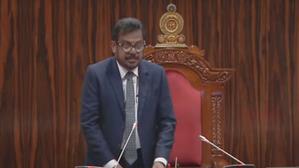
The appointment of Speaker Ashoka Ranwala came under sharp scrutiny last week after doubts surfaced about his claimed doctoral qualifications. Social media erupted with allegations that Ranwala lacked a valid PhD, with no thesis or academic records available to substantiate his credentials. Critics, including academics and activists, emphasized the broader implications for the JVP/NPP-led Government, given its historical critique of politicians with fake qualifications.
Dr. Kumara Kaluarachchi of Rajarata University filed a Right to Information (RTI) request with Moratuwa University seeking clarification on Ranwala’s academic claims. Similarly, prominent figures such as former Elections Commissioner Mahinda Deshapriya and former FUTA President Nirmal Ranjith Dewasiri called for transparency, urging Ranwala to step down if proven guilty of misrepresentation.
The Opposition has hinted at moving a no-confidence motion against the Speaker, aiming to expose inconsistencies in his academic claims. While this move may lack parliamentary majority support, it threatens to tarnish the credibility of the JVP/NPP and its pledge of integrity.
Economic Stability amid Fiscal Challenges
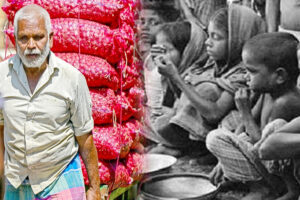
President Dissanayake’s administration continues to navigate Sri Lanka’s complex economic landscape, marked by inflation, debt burdens, and public discontent. In line with its reformist stance, the Government has prioritized fiscal discipline, evident in its decision to maintain electricity tariffs and curtail state expenditures. Notably, the subdued opening of the 10th Parliament saved nearly 80% of typical inaugural expenses, underscoring the administration’s cost-conscious approach.
The recently presented interim Vote on Account for early 2025 allocates Rs. 1,402 billion for state operations, debt servicing, and restructuring efforts. This aligns with Sri Lanka’s IMF bailout commitments, as the Government negotiates favorable terms for external debt exceeding $50 billion. While ambitious reforms aim to revive investor confidence, the administration faces rising expectations for equitable growth, anti-corruption measures, and public service delivery.
Tamil National Question and Provincial Elections
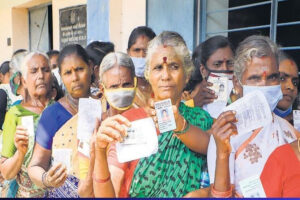
In a meeting with representatives of the Ilankai Tamil Arasu Katchi (ITAK), President Dissanayake addressed longstanding grievances of Tamil communities, including military-occupied lands and Tamil political prisoners. He reiterated his commitment to resolving the “Tamil national question” through constitutional reforms, projected to take two to three years. Furthermore, the Government has promised long-overdue Provincial Council elections by the end of 2025, signaling a gradual approach to regional autonomy.
President Dissanayake’s India Visit: A Diplomatic Challenge
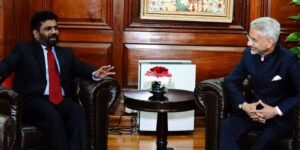
President Dissanayake is preparing for his first overseas state visit to India—a significant diplomatic test for the JVP/NPP, given its lack of prior engagement in high-level international relations. The visit is expected to focus on reevaluating bilateral agreements, particularly Indian-funded projects accused of corruption under previous administrations.
Discussions with Indian Prime Minister Narendra Modi will likely include infrastructure, trade, and investment, as Sri Lanka seeks to assure investors of transparency and adherence to contractual obligations. However, former President Wickremesinghe’s remarks on maintaining his administration’s Indo-Lanka agreements have added pressure, as Dissanayake aims to establish his own diplomatic roadmap. This visit will be pivotal in shaping Sri Lanka’s regional alliances and economic trajectory.
US Engagement and Broader Foreign Policy
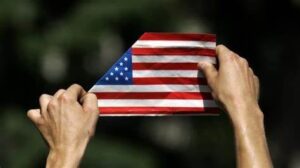
Last week, a high-level US delegation met with President Dissanayake to discuss strengthening bilateral ties. The meeting highlighted Sri Lanka’s strategic importance in the region, with the US emphasizing its interest in economic collaboration and democratic governance. This engagement, alongside the President’s upcoming visit to India, underscores the delicate balancing act required to navigate international relationships amidst domestic reforms.
Conclusion
Sri Lanka stands at a crossroads, grappling with immediate governance challenges while pursuing long-term economic and institutional reforms. Parliamentary debates on liquor licenses and Speaker Ranwala’s qualifications reflect the broader need for accountability, while efforts to address Tamil grievances and strengthen foreign partnerships highlight the complexities of leadership under the JVP/NPP.
President Dissanayake’s administration must navigate these interconnected challenges with prudence, ensuring that public trust in its reform agenda is not eroded by political distractions or unfulfilled promises.
